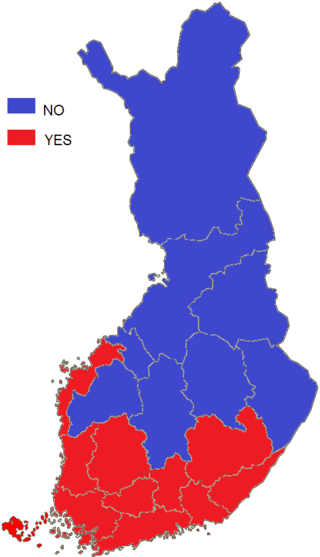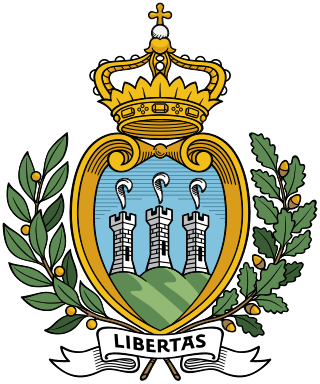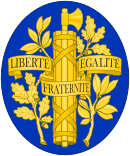
A referendum on the enlargement of the European Communities (EC) was held in France on 23 April 1972. Voters were asked whether they approved of Denmark, Ireland, Norway and the United Kingdom joining the EC, although Norway later voted in its own referendum not to join. The proposals were approved by 68.3% of voters, with a turnout of 60.2%.

A constitutional referendum was held in France on 21 October 1945. Voters were asked whether they approved of the Assembly elected on the same day serving as a Constituent Assembly, and whether until a new constitution was approved, the country would be governed according to a proposed set of laws that appeared on the ballot paper. If the first proposal had not been approved, the Third Republic would have been restored, but its approval led to the elected Assembly drafting a constitution and proposing it to the people a year later, resulting in the creation of the Fourth Republic. Both were approved by wide margins with a turnout of 79.8%.

A constitutional referendum was held in France on 5 May 1946. Voters were asked whether they approved of a new draft Constitution proposed by the Constituent Assembly elected in 1945.

A constitutional referendum was held in France on 13 October 1946. Voters were asked whether they approved of a new constitution proposed by the Constituent Assembly elected in June. Unlike the May referendum, which saw a previous constitutional proposal rejected, the new Constitution of 27 October 1946 was accepted by 53.2% of voters, and brought the Fourth Republic into existence. Voter turnout was 67.6%.

A constitutional referendum was held in France on 28 September 1958. Voters were asked whether they approved of the adoption of a constitution for the French Fifth Republic written by Charles de Gaulle. It was overwhelmingly approved, with 82.6% in favour. Voter turnout was 84.9% in metropolitan France and 79.8% overall.

A referendum on self-determination for Algeria was held in France on 8 January 1961. Self-determination was approved by 75% of voters overall and 70% in Algeria. Voter turnout was 92%. The referendum question was worded as follows:
"Approuvez-vous le projet de loi soumis au peuple français par le président de la République et concernant l'autodétermination des populations algériennes et l'organisation des pouvoirs publics en Algérie avant l'autodétermination ?"
"Do you approve the bill submitted to the French people by the President of the Republic and concerning the self-determination of the populations of Algeria and the organization of the public authorities in Algeria prior to self-determination?"

A constitutional referendum was held in France on 8 May 1870. Voters were asked whether they approved of the liberal reforms made to the constitution since 1860 and passed by the Sénatus-consulte on 20 April 1870. The changes were approved by 82.7% of voters with an 81.3% turnout. However, France's defeat in the Franco-Prussian War caused the Empire to be abolished later that year. Although this was the ninth constitutional referendum in French history, it was the first to have more than 8% oppose the motion; four of the previous seven had officially gained 99% approval.

A referendum on re-establishing the Empire was held in France on 21 and 22 November 1852. Voters were asked whether they approved of the re-establishment of the Empire in the person of Louis Napoléon Bonaparte and family. It was approved by 96.9% of voters with a 79.8% turnout. As with other plebiscites under Napoleon III, the results were rigged and only served to legitimize their rule under a false sense of democracy.

A referendum was held in France on 20 and 21 December 1851. Voters were asked whether they approved of the continuation of the authority of Louis Napoléon Bonaparte and to delegate the powers required to produce a new constitution. It was approved by 92% of voters with an 81.7% turnout.

An advisory referendum on joining the European Union was held in Finland on 16 October 1994. 56.9% of voters approved of the proposal, with a voter turnout of 70.8%. Due to having its own customs jurisdiction, a separate referendum was held in Åland a month later, and was also approved.

A double referendum was held in Liechtenstein on 25 February 1962. The first question was on the subject of the law on civic defence, and was rejected by 74.3% of voters. The second was on the game hunting law, and was approved by 54.6% of voters.

Three referendums were held in Liechtenstein during 1973. The first was held on 11 February on introducing women's suffrage, but was rejected by 55.9% of voters. The second was held on 14 October on changing the electoral system to a candidate-based proportional system one, and was approved by 55.8% of voters. The third on 14 October was on reducing the electoral threshold from 18% to 8%, and was approved by 67.9% of voters.

A referendum on creating administrative regions was held in Portugal on 8 November 1998. Two proposals were put to voters, the first on implementing the regions, and the second specifically asking whether voters approved of the new region for their area. The proposals were rejected by wide margins by voters.

A referendum on the electoral law was held in San Marino on 3 July 2005. Voters were asked four questions on changes to the electoral law and electoral system. Although all four were approved by a majority of those voting, voter turnout was just 21.7%, meaning that the quorum of 32% of registered voters (10,143) was not achieved for any question. This resulted in all four questions failing, including two that proposed raising the quorum to 40%.
Two referendums were held in Switzerland in 1876. The first was held on 23 April on the subject of distributing and cashing of banknotes, and was rejected by 61.7% of voters. The second was held on 9 July on a federal law on taxation of compensation for not serving in the military, and was rejected by 54.2% of voters.
Two referendums were held in Switzerland in 1887. The first was held on 15 May, asking voters whether they approved of a federal law on spirits, and was approved by 65.9% of voters. The second was held on 10 July, asking voters whether they approved of an amendment made to article 64 of the federal constitution, and was approved by 77.9% of voters and 20.5 cantons.
Five referendums were held in Switzerland in 1891. The first was held on 15 March on a federal law on federal officials who had become unemployable due to disability, and was rejected by 79.4% of voters. The second was held on 5 July on a constitutional amendment, and was approved by 60.3% of voters. Two referendums were held on 18 October, one on revising article 39 of the federal constitution and one on a federal law on Swiss tariffs; both were approved. The last was held on 6 December on the question of whether the federal government should purchase the Swiss Central Railway, but was rejected by 68.9% of voters.
A referendum on the electoral system was held in Switzerland on 23 October 1910. Voters were asked whether they approved of introducing proportional representation for National Council elections. Although the proposal was approved by a majority of cantons, it was rejected by 52.5% of voters. This was the second such referendum, after the one in 1900 also failed. However, a third referendum on the same issue was held in 1918, and passed with 66.8% in favour.
Six referendums were held in Switzerland during 1938. The first four were held on 20 February; the first on amending articles 107 and 116 of the constitution to make Romansch an official language, which was approved by over 90% of voters and all cantons. The second was on a popular initiative "on urgent federal resolutions and the protection of people's rights" and was rejected by 85% of voters. The third was on a popular initiative on the private arms industry, and was also rejected by a wide margin, whilst the fourth was on a counter-proposal to the arms industry question, and was approved by voters. The fifth referendum was held on 3 July on the penal code, and was approved. The sixth and final referendum of the year was held on 27 November on a federal resolution on the transient order of the federal budget, and was approved by 72% of voters.
Four referendums were held in Switzerland in 1962. The first was held on 1 April on a popular initiative to ban nuclear weapons, and was rejected by 65% of voters. The second and third were held on 27 May on an amendment to the constitution regarding nature conservation and a federal law amending pay at the federal level. The constitutional amendment was approved, but the law on pay was rejected. The final referendum was held on 4 November on another constitutional amendment on the method of election of the National Council, and was approved by voters.







